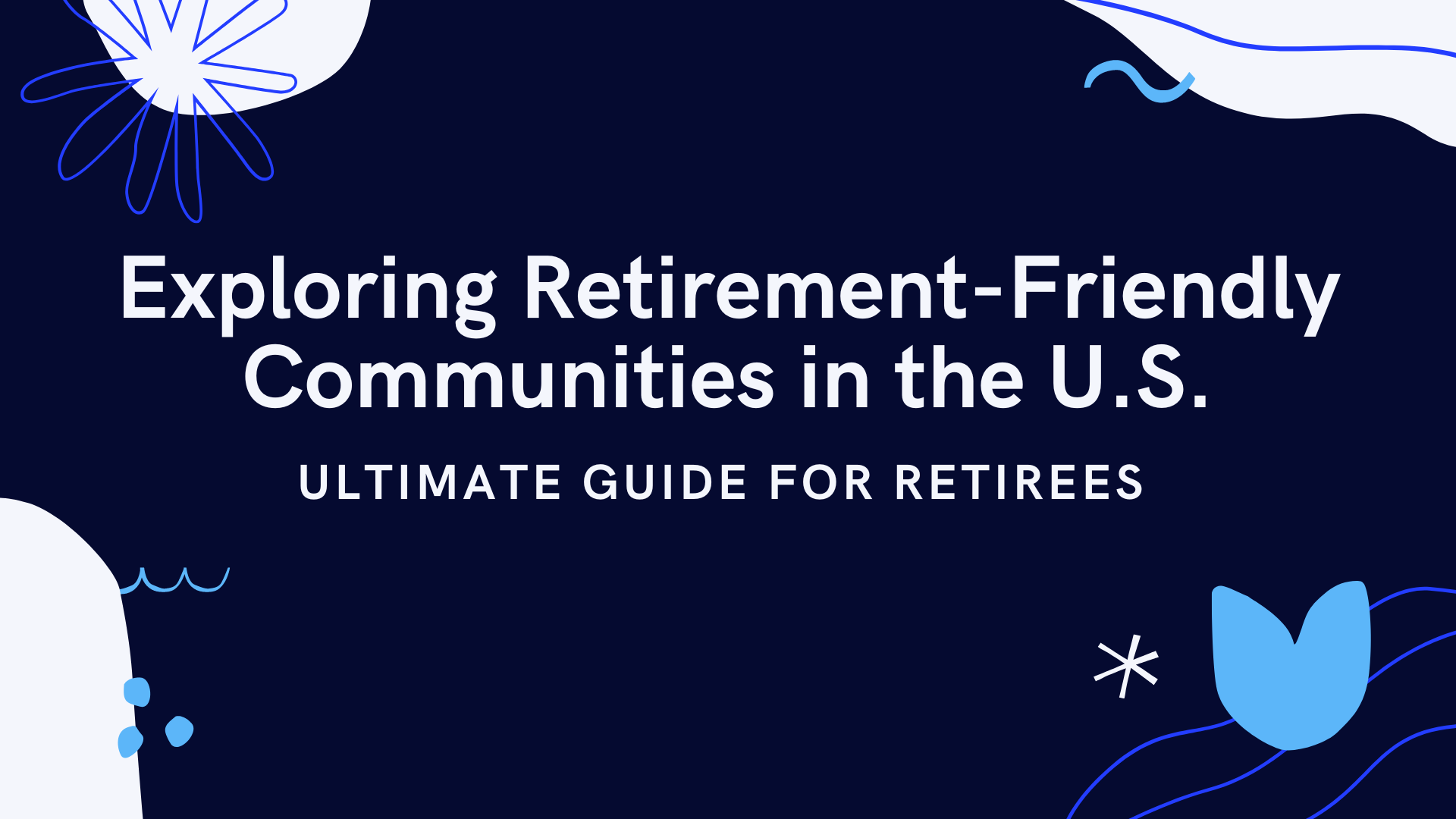20 Retirement Planning Mistakes: Must Know For Everyone

Getting older and preparing for retirement can feel overwhelming, but with the right planning and awareness, you can make the transition smoother and stress-free. Avoiding common mistakes early on can set you up for a more secure and enjoyable retirement.
Recent research highlights just how crucial proper planning is. A 2024 survey found that 79% of Americans believe the country is facing a retirement crisis—up from 67% in 2020. Even more concerning, 55% of people worry about whether they’ll have enough savings to retire comfortably.
To help you stay on track, we’ve compiled 20 of the biggest retirement planning mistakes—and how to avoid them.
From this article you’ll explore:
- Mistakes you can often face while planning retirement,
- Dangers of such situations can be, and
- Tips to avoid the most common retirement mistakes.
Table of Contents
- Having No Retirement Plan
- Expecting the government to look after you
- Counting on an inheritance
- Carrying credit card debt
- Taking too much risk — or too little
- Expecting to work past retirement age
- Not having an estate plan
- Forgetting about inflation
- Not accounting for healthcare costs
- Paying more tax than you need to
- Not being realistic
- Failing to update important documents
- Paying High Retirement Account Fees
- Agreeing to Support Adult Children
- Putting Your Funds in One Place
- Pulling Out Money Early
- Borrowing From Your Retirement Account
- Not Researching Housing
- Not Reviewing and Reassessing Your Plan
- Not Planning for a Longer Retirement
Having No Retirement Plan
Retirement is a major life transition, yet many people fail to plan for it. The best time to start is as early as possible, but even starting today is better than delaying further.
A basic retirement plan includes:
- Assessing your finances: Calculate your net worth by subtracting liabilities from assets.
- Projecting future wealth: Estimate earnings growth and investment returns until retirement.
- Identifying income sources: Consider pensions, government benefits, and personal retirement plans.
- Evaluating expenses: Compare current and future living costs to understand financial needs post-retirement.
Taking these simple steps can provide a clearer picture of your financial future and help you prepare for a stable and secure retirement.
Expecting the government to look after you
If you've spent most of your life working in Canada, you’re likely relying on government benefits for retirement. However, even if you qualify for Old Age Security (OAS), Canada/Quebec Pension Plan (CPP/QPP), and the Guaranteed Income Supplement (GIS), the total payout is less than $24,000 per year—which may not be enough to cover basic living expenses.
To boost your retirement income:
- Start saving now through RRSPs, TFSAs, company pensions, and personal savings.
- Assess your finances to determine if your current savings align with your retirement goals.
- Make adjustments if needed—save more each month, delay retirement, or consider partial retirement to supplement your income.
Being proactive about savings and planning can help ensure a more comfortable and secure retirement.
Counting on an inheritance
Many headlines highlight the "trillion-dollar wealth transfer" from baby boomers to their children, but relying on an inheritance for retirement is risky. While your parents may have assets like a home, investments, or savings, they may need those funds for their own care, especially if health issues arise.
Key retirement planning takeaways:
- Don’t count on an inheritance—it’s uncertain and may go to other family members, a former spouse, or charity.
- Have an open conversation with your parents about their financial plans to ensure they can support themselves.
- Plan your retirement independently so you're not caught off guard if your parents need financial help instead of leaving an inheritance.
By focusing on your own savings and planning, you can secure your retirement without relying on uncertain future wealth.
Carrying credit card debt
Paying off debt is crucial for a secure retirement, but many don’t prioritize it enough. Aim to be debt-free, except for your mortgage. Once other debts are cleared and retirement savings are on track, focus on paying down your mortgage.
Financial independence in retirement starts with eliminating debt and securing your future.
Taking too much risk — or too little
As retirement nears, some people panic—either taking excessive risks with speculative investments or playing it too safe by moving everything into cash or fixed annuities. Both approaches can hurt long-term growth and financial security.
Instead, work with a CFP to develop an investment strategy tailored to your goals. If you prefer managing your own portfolio, find a planner who can guide you without taking full control. A balanced strategy helps avoid costly extremes and ensures a stable retirement.
Expecting to work past retirement age
Many people plan to work until 65 or 70, but unexpected events like layoffs, health issues, or family matters can force early retirement. In fact, a 2022 EBRI survey found that 47% of people retire sooner than planned.
Losing a job in your 60s can make finding a new one—especially with similar pay and benefits—difficult. That’s why experts recommend planning for an earlier retirement so working into your 60s becomes a choice, not a necessity.
Not having an estate plan
Estate planning isn’t just for your parents—it’s essential for you too. To protect what you’ve built, you need a will and powers of attorney for property and healthcare, forming the foundation of your estate plan.
Key Considerations:
- You don’t need to be wealthy to have an estate plan—a will ensures your assets go to the right people and appoints an executor.
- If you don’t have a will, consult a legal professional to create one.
- Review and update your estate plan regularly to reflect life changes, such as new beneficiaries or a different executor.
Having a solid estate plan safeguards your loved ones’ future and ensures your wishes are honored.
Forgetting about inflation
Inflation in Canada has been historically low in recent years, but it hasn’t always been that way. For example, in 1981, inflation soared past 12%, significantly reducing purchasing power. When living on a fixed income, rising costs can seriously impact your financial security.
How to Protect Yourself:
- While you can’t control inflation, you can invest wisely to keep your savings growing.
- Money sitting in a low-interest bank account may lose value over time.
- Consult an investment advisor to find suitable options that offer higher returns while managing risk.
Ensuring your money works for you is key to maintaining financial stability in retirement.
Not accounting for healthcare costs
Losing employer-sponsored health benefits after retirement can make prescriptions, eyeglasses, and physiotherapy more expensive. While the government covers some medications for seniors, many healthcare costs are not included.
How to Prepare:
- Check if your workplace benefits can be converted into a standalone policy after retirement.
- Some plans, like Manulife’s FollowMe™ Health and Dental Insurance, offer guaranteed acceptance if you apply within 90 days of losing group benefits.
- While coverage may differ and premiums come out of pocket, it can be a cost-effective way to manage healthcare expenses.
Planning ahead for healthcare costs ensures you’re financially prepared for medical needs in retirement.
Paying more tax than you need to
A key part of retirement planning is managing taxes on your income to maximize cash flow. In Canada, the two main savings options—RRSPs and TFSAs—offer tax advantages, but they differ when it comes to withdrawals.
Tax Implications:
- RRSP/RRIF withdrawals are taxable at your marginal tax rate (MTR) because contributions were made with pre-tax income. For example, if your MTR is 35%, a $20,000 withdrawal means $7,000 goes to taxes.
- TFSA withdrawals are tax-free, since contributions were made with after-tax income. A $20,000 withdrawal means you keep all of it, and it won’t affect your MTR or eligibility for income-tested benefits like OAS.
Strategy:
By carefully planning when and how to withdraw from these accounts, you can minimize taxes and optimize retirement income.
Not being realistic
Whether your dream retirement involves traveling the world or simply enjoying time with family, you need to understand the cost of your lifestyle and how much to save now to achieve it.
Key Considerations:
- Many retirement calculators assume lower expenses, but that’s not always true—some costs may decrease, while others (like healthcare or travel) may rise.
- Assess your current budget and realistically estimate future expenses.
- If your projected savings fall short, you have two options:
- Adjust your expectations to fit your budget.
- Increase your savings to afford your ideal retirement.
By planning ahead, you can align your retirement vision with financial reality and enjoy a stress-free future.
Failing to update important documents
An estate plan ensures your assets are distributed as intended and designates who will manage your affairs if you become incapacitated. It also determines guardianship for minor children.
Key Considerations:
- Many people create a will but don’t update it—life changes, and so should your plan.
- Experts recommend regularly reviewing your wills, trusts, healthcare proxies, living wills, powers of attorney, and beneficiary designations to keep them current.
If your estate plan is outdated, now is the time to update it to reflect your current wishes.
Paying High Retirement Account Fees
Most retirement accounts are managed by investment professionals who charge fees—regardless of performance.
Key Takeaways:
- Management fees vary and can impact your retirement savings over time.
- Some funds aren’t transparent about their fees, making it important to review fee structures before choosing a plan.
To maximize your retirement savings, always compare and understand the costs associated with your fund.
Agreeing to Support Adult Children
Supporting adult children financially—whether for tuition, weddings, or other expenses—can be generous, but it may impact your own retirement savings.
Key Takeaway:
- While helping your children is meaningful, ensure your retirement is secure first before offering financial assistance.
- Balance generosity with financial planning to avoid putting your future at risk.
By prioritizing your retirement savings, you can maintain financial independence while still supporting your family when possible.
Putting Your Funds in One Place
Relying too much on a single asset class, like stocks or cash, can be risky.
Key Takeaway:
- Diversification is key—spread investments across stocks, bonds, real estate, and other assets to reduce risk and enhance potential returns.
A well-balanced portfolio helps protect your retirement savings from market fluctuations and ensures long-term financial stability.
Pulling Out Money Early
Tapping into your retirement funds early may provide short-term relief but can reduce your financial security in later years.
Key Takeaway:
- Instead of withdrawing early, build an emergency fund during your working years to cover unexpected expenses.
- Keeping retirement savings intact ensures long-term financial stability and reduces the risk of running out of money.
Planning ahead with a dedicated emergency fund can help you avoid jeopardizing your future retirement income.
Borrowing From Your Retirement Account
Many retirement plans allow loans, but withdrawing funds can hurt your long-term financial growth.
Key Takeaways:
- Borrowing from your retirement savings prevents your money from growing through dividends and capital appreciation.
- While it may seem tempting, using retirement funds for discretionary spending can reduce your future financial security.
Think of it as stealing from your future self—avoid this mistake to keep your retirement on track.
Not Researching Housing
Housing costs can significantly impact your retirement savings, so it’s essential to plan carefully.
Key Considerations:
- Select a location and home that fit your budget and long-term needs, including accessibility and proximity to essential services.
- Factor in natural disaster risks, as they can affect safety and maintenance costs.
By making smart housing choices, you can preserve your nest egg and ensure a comfortable, secure retirement.
Not Reviewing and Reassessing Your Plan
Periodic reviews and adjustments help ensure you don’t run out of money in retirement.
Key Takeaways:
- A financial planner can identify gaps, suggest improvements, and help optimize your investments.
- Staying informed about economic trends can help you make better financial decisions.
Regular check-ins with a professional or self-assessment keep your retirement plan on track for long-term stability.
Not Planning for a Longer Retirement
With rising life expectancy, retirement could last 15-20 years or more.
Key Takeaways:
- In 2022, Europe’s average life expectancy was 78.33 years and is expected to keep increasing.
- If you're 40 now, by 2048, your life expectancy could be 82+, meaning a retirement of nearly two decades.
A longer retirement requires careful financial planning to ensure your savings last.



